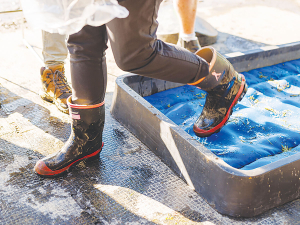NZ winegrowers advance vineyard biosecurity in 2025
The year was marked by “progress, collaboration and reflection” in biosecurity, says New Zealand Winegrowers Biosecurity Advisor Jim Herdman.
 Good biosecurity practices also help to manage endemic diseases like Bovine viral diarrhoea (BVD) and Johne’s disease.
Good biosecurity practices also help to manage endemic diseases like Bovine viral diarrhoea (BVD) and Johne’s disease.
OPINION: When it comes to biosecurity, we often hear about the end of a response, but it’s the beginning that helps determine our success.
August is Biosecurity Awareness Month and a timely reminder that we need to stay vigilant to help protect our valuable dairy sector.
In June, it was reported that New Zealand could be provincially declared free of Mycoplasma bovis (M. bovis) as early as October 2025; A huge milestone and one we should be proud of.
It’s a milestone that could only be achieved through the tough decisions made along the way.
We want to take the experiences and lessons we had through the M. bovis response to prepare for future disease outbreaks.
We recently signed a new operational agreement on Foot and Mouth Disease (FMD) with the Government and sector partners which sets out how the costs of FMD readiness and response activities will be shared.
It also creates legally binding participation of industry in decision-making, ensuring that farmers’ interests, knowledge, and input is heard.
It is a real partnership, not only between the sector and Government but also within sector partners.
As part of the agreement, dairy, beef, sheep, pork, and deer farmers are represented, as well as dairy and meat processors. Each has a strong voice at the negotiation table.
As the inaugural chair of the Foot and Mouth Disease Council it’s something that I’m personally proud to have achieved. And I want to keep that momentum going.
We are reviewing our FMD operational plans and looking at the role the sector plays during a response.
We want to boost our workforce capability and capacity, so we have the right people with the right knowledge in place if we had another serious disease outbreak.
We are also focusing on refining the compensation system. We need a pragmatic and fair system that will provide farmers with the support they need. That includes timely, fair, and consistent compensation that allows farmers to get back to business as fast as possible.
Good biosecurity practices not only provide a degree of protection against potential exotic disease outbreaks, but they can also help to manage endemic diseases like Bovine viral diarrhoea (BVD) and Johne’s disease.
It can be as simple as:
Biosecurity is not just about emergencies, it's about a consistent and integrated approach to risk reduction, readiness, response, and recovery.
Getting the planning right isn't just important, it's everything.
Campbell Parker is DairyNZ chief executive.
Global trade has been thrown into another bout of uncertainty following the overnight ruling by US Supreme Court, striking down President Donald Trump's decision to impose additional tariffs on trading partners.
Controls on the movement of fruit and vegetables in the Auckland suburb of Mt Roskill have been lifted.
Fonterra farmer shareholders and unit holders are in line for another payment in April.
Farmers are being encouraged to take a closer look at the refrigerants running inside their on-farm systems, as international and domestic pressure continues to build on high global warming potential (GWP) 400-series refrigerants.
As expected, Fonterra has lifted its 2025-26 forecast farmgate milk price mid-point to $9.50/kgMS.
Bovonic says a return on investment study has found its automated mastitis detection technology, QuadSense, is delivering financial, labour, and animal-health benefits on New Zealand dairy farms worth an estimated $29,547 per season.

OPINION: Here w go: the election date is set for November 7 and the politicians are out of the gate…
OPINION: ECan data was released a few days ago showing Canterbury farmers have made “giant strides on environmental performance”.